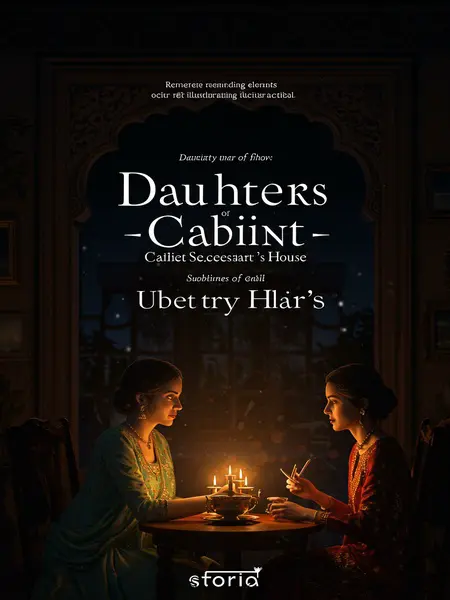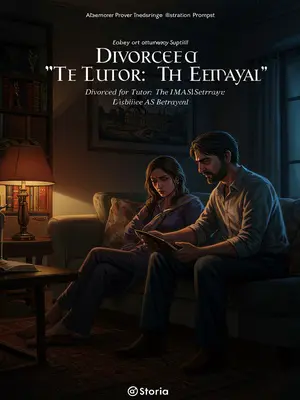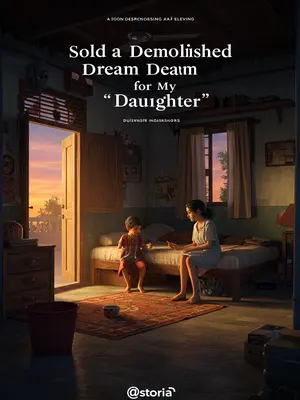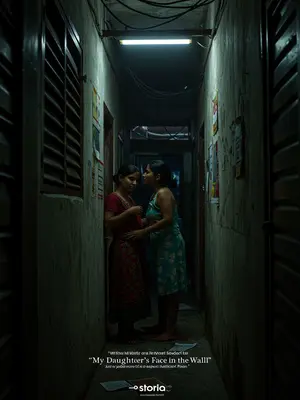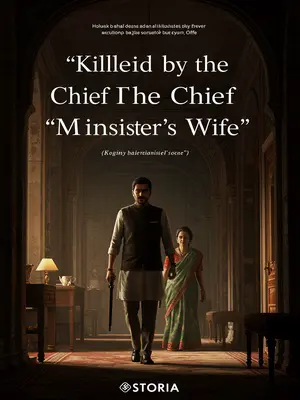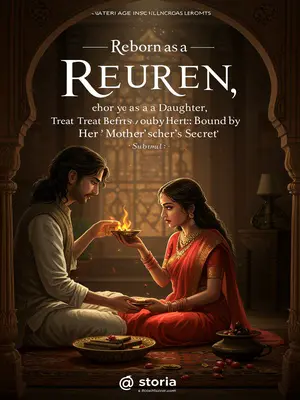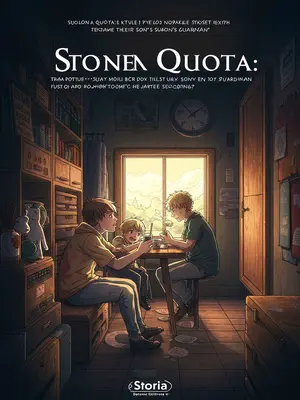Chapter 3: Under the Gulmohar Tree
By late spring, the gulmohar bloomed in full. Eldest Sister met our Sharma family cousin beneath the flower trellis. Though he was of humble birth, he was handsome. Yet after repeated failures at the UPSC exams, he was left to tend the gardens in our residence.
Lucknow’s air was scented with ripe mangoes and the promise of rain. I remember the way Cousin Sharma’s hands, calloused from work, looked out of place against the delicate gulmohar petals. He would hum old film songs while pruning the roses, a gentle defiance in every note.
For reasons unknown, Eldest Sister accepted from him a handkerchief embroidered with the words "Together for Life," keeping it close day and night. From then on, she would always use the excuse of taking me to fly kites in order to visit the secluded garden. Once the kite was aloft, she would feign fatigue, sending me to pick flowers alone, while she went to rest in the northwest gazebo.
I remember Eldest Sister’s eyes lighting up at the mention of kites, a mischief that made her seem much younger. Yet, her steps would always slow as we neared that gazebo, her hand brushing mine before she sent me away.
That day, the secluded garden was especially quiet. I was on tiptoe, winding up the kite string, when suddenly I glimpsed the hem of a stone-blue kurta behind the large banyan tree. Father stood there, his face as dark as iron—I did not know when he had arrived. Strangely, there were no crowds of guests or servants with him; only Uncle Sharma and two young helpers stood three paces away, heads bowed like three wooden figures.
I can still hear the shrill call of a koel in the distance, a sudden hush falling over the garden. Father’s silence was more frightening than any outburst; it was the silence of an impending storm.
The spool in my hand dropped with a snap. The world seemed to hold its breath. Even the koel outside fell silent. Father’s gaze swept over me like a blade. I hurriedly lowered my head, but out of the corner of my eye, I saw the bamboo curtain of the small gazebo sway in the wind, faintly revealing the shadows of Eldest Sister and the scholar, their hands joined.
My heart thudded in my chest, as if the world held its breath. I wanted to run but my feet felt glued to the ground. I could almost smell the fear, sharp and metallic, like when Dadi scolded us as children.
Gulmohar petals drifted down, several landing by Father’s black shoes, only to be ground into the mud beneath his heel. When Cousin Sharma was dragged out by the helpers, his face was already ashen.
The air vibrated with the tension of secrets laid bare. Not even the distant rumble of a passing scooter could break the spell of that moment. The petals, once beautiful, now looked like drops of blood against the earth.
Eldest Sister, however, straightened her back, defying Father for the first time in her life. "Your daughter does not wish to be a caged bird in a golden cage, but would rather be a pair of birds enduring hardship together…"
Her voice trembled, but her eyes blazed with a courage I had never seen. In that moment, she looked both fragile and indomitable, a princess choosing her own ruin.
"Foolish," Father said, smiling instead of showing anger. "Do you truly believe there is a place in this world untouched by power and influence? If today you lose the title of the Cabinet Secretary’s daughter, tomorrow you will understand: a sincere heart, without power to shield it, is nothing but a goat led to the bakra mandi."
He spoke with a calmness that chilled the soul, his words carrying the weight of a hundred years of family wisdom. It was the voice of a man who had outlasted rivals, survived betrayals, and understood what it meant to wield power in India.
Eldest Sister tried to say more, but Father raised his hand, cutting her off. "If the words of the wise cannot cool your fevered heart, then let the world teach you."
A servant dropped a brass tray somewhere inside, the clang echoing through the corridor like a warning bell. No one dared move as Father’s verdict fell.
That night, Eldest Sister was bound hand and foot, bundled into a curtained Ambassador car, and sent to the family’s country estate.
I remember her muffled cries as the car rolled out under the neem trees, the headlights painting long shadows on the drive. The house was quieter than a temple at midnight, even the dogs sensing the storm had passed.
Mother summoned the four remaining sisters to her side, slowly trimming the hibiscus bonsai with golden scissors. "Do you know why daughters of noble families must master sitar, chess, calligraphy, and painting? It is not for the sake of hollow elegance. It is so you may understand that the most moving refinement in the world often conceals the cruelest of choices."
She clipped a stray branch, her gold bangles jingling—a sound almost soothing, except for the cold gleam in her eyes. We gathered at her feet, the scent of hibiscus and antiseptic mingling in the air.
She looked up suddenly, her gaze sweeping over us. "The daughters of the Cabinet Secretary’s house may speak of love, but only beneath embroidered canopies adorned with golden peacocks, only upon genealogies of equal gold. Do you all remember this?"
The gravity in her voice settled over us like dust on an old carpet. Even the youngest, little Ira, stilled her fidgeting, her eyes wide with fear and understanding.
We sisters knelt and touched our foreheads to the floor in answer.
My forehead pressed against cool marble, the memory of Eldest Sister’s laughter now a distant echo. In that gesture, we accepted our fates, even as our hearts rebelled in silence.
Just over a month later, Eldest Sister sent a letter home. The letter was stained with tears, each word heavy with regret. After Mother read it, she tossed it into the havan fire, the flames curling it into black butterflies.
I remember watching the letter burn, the sweet scent of camphor mingling with the acrid smoke. Second Sister’s eyes flickered, perhaps with relief or sorrow, it was impossible to say.
Second Sister, ever attentive, offered a handkerchief. Mother took it and asked, as if in passing, "After Diwali, it will be time to consider your marriage. Is there any gentleman you favour?"
Second Sister leaned into Mother’s arms, coquettishly replying, "Though your daughter is dull, I know the ‘Nari Shiksha’ teaches us to be chaste, tranquil, and orderly. Marriage is for parents to decide; I only hope to serve filial piety for a few more years."
Her voice was honey-sweet, but the calculation behind it shone as clear as the oil lamp beside Mother’s chair. In our home, even obedience was a form of strategy.
Though not as dazzling as Eldest Sister, Second Sister’s lively features and proper conduct were most pleasing. A glimmer of approval flashed in Mother’s eyes; she drew Second Sister close and said softly, "Three days hence, you shall accompany me to the Prince of Rajpur’s flower-viewing party."
The smile on Mother’s face was the kind reserved for a daughter who has learned her lessons well. The unspoken message was as clear as if she had declared it aloud.
I understood: this was a tacit arrangement. Such is the way of great households—every word and gesture is laden with meaning, and even maternal affection is laced with calculation.
The kitchen would soon buzz with preparations, the air thick with cardamom and cinnamon. But beneath it all, the dance of alliances continued, uninterrupted by the clatter of vessels or the laughter of servants.
